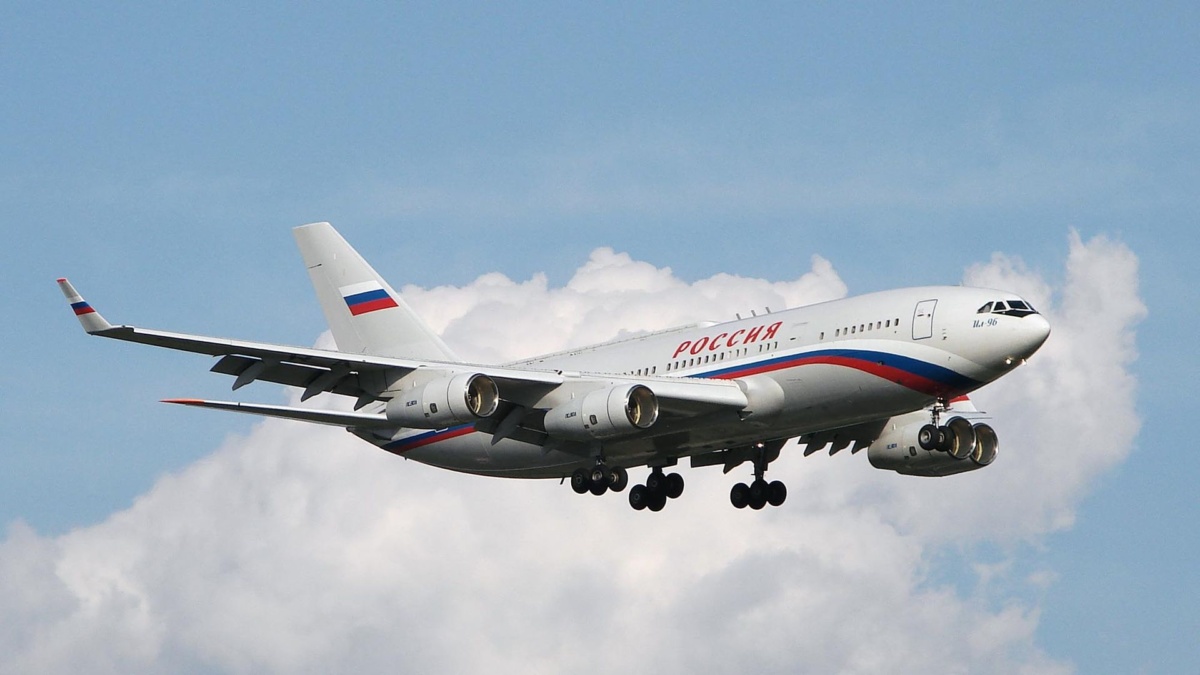When it came to selecting the new Russian head of state plane, the government turned to local manufacture Ilyushin to come up with a rival to the United States Air Force One – The Ilyushin Il-96. Why did they choose this plane? And how has Russia fitted it for its head of state? Let’s explore.

Why Russia chose the Ilyushin Il-96
The Russian government fleet is as varied as a typical international carrier. Thus far, it has:
- Two Airbus A319s
- Eight II-96s
- Two Sukhoi Superjets
And previously had access to a fleet of Tu-154, Tu-204, Yak-40s as well as two helicopters.
However, only one aircraft in that list can do the distance, the II-96. So far, there are only 15 in the world that are in service, with 10 in use in Russian and only three for passenger use in Cuba. You can read about the Cubana here.
The Russian government chose the Il-96-300 as its future diplomate aircraft, in a deal that cost around $504 million per plane. The passenger version of the airframe can fly 300 passengers to a range of 11,500 km (6,209 nautical miles), although it is likely that the head of state VIP craft can fly further thanks to a lighter passenger load and significant fuel tank improvements. The VIP Il-96 is ten meters longer than the civil version at 65 meters.
As the aircraft is assembled by hand for each customer (it isn’t mass-produced like Airbus or Boeing aircraft), there are minimal spare parts or a second-hand market for the type.
What is the aircraft like inside?
There are four Il-96-300’s in-service dedicated for the head of state transport (compared to the two Air Force One Boeing 747-200 planes), and at least two deploy for every diplomatic trip. Allegedly when Putin arrives at the airport, all four are fueled up and ready to go, and he selects one at seemingly random.
And boy, what an adventure it would be. The aircraft’s interior is fit for an emperor with a neo-classical fit-out. This features fur rugs throughout (and even used instead of a red carpet for boarding that you can see in the video below). Hanging on the walls are famous Russian tapestries, and all edges lined with gold.
https://www.youtube.com/watch?v=VelHjtczsRU
Onboard there is a large board room, spacious office, a master bedroom with a king-sized bed (there is a theme here), and even a very spartan gym. There are full showers inside the bathrooms (fitted with gold handles no less).
Photos of #Putin‘s private jet. It even has a bidet. A bidet.https://t.co/9ujo1CYTJx
via @EuromaidanPress pic.twitter.com/wkT7pP9LGj— ArianaGic/Аріянॳць (@GicAriana) March 21, 2015
They don’t have any special livery compared to the airline Rossiya, although there is a unique presidential seal at the front of the plane.
Inside President Putin’s private jet which looks like a fancy hotel https://t.co/ewuaxsagZS pic.twitter.com/sgM4m8WPrs
— Legit.ng (@legitngnews) July 19, 2018
The plane also comes with a full communications suite (to lead a country in time of war) and plenty of missile countermeasures. The aircraft also allegedly has an escape pod if the countermeasures don’t work. Whenever Putin flies onboard, the flight plan is classified, and Russian fighter jets escort the plane (even overland Russia).
Military jets escort Putin’s Russian Air Force One as he flies to Russia’s Hmeimim air base in northern Syria. Putin usually flies on an Ilyushin II-96. https://t.co/FMlvjvRsuA pic.twitter.com/2qkDTOb52X
— Jeff Daniels (@JeffDanielsCA) December 15, 2017
The Russian government has been criticized for such lavish aircraft and having so many of them in the past. While we can’t speak for the politics of the situation (like how Mexico’s president put its new Boeing 787 up for sale), we can’t help but admire nation-building its long-range jets for its head of state (compared to China who operated a Boeing 747-8 for its VIP transport).

What do you think? Let us know in the comments.
[ad_2]
Source link

Leave a Reply